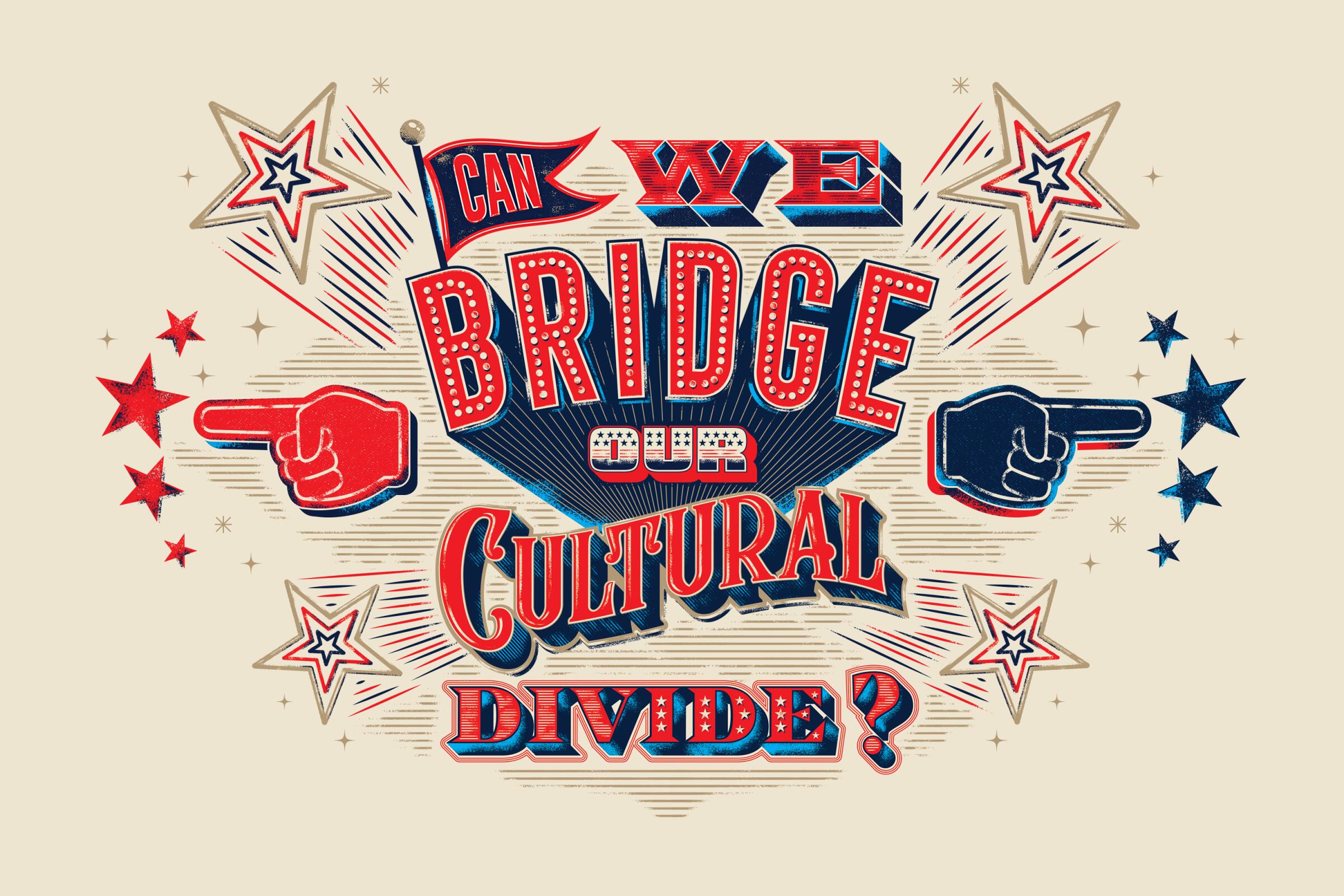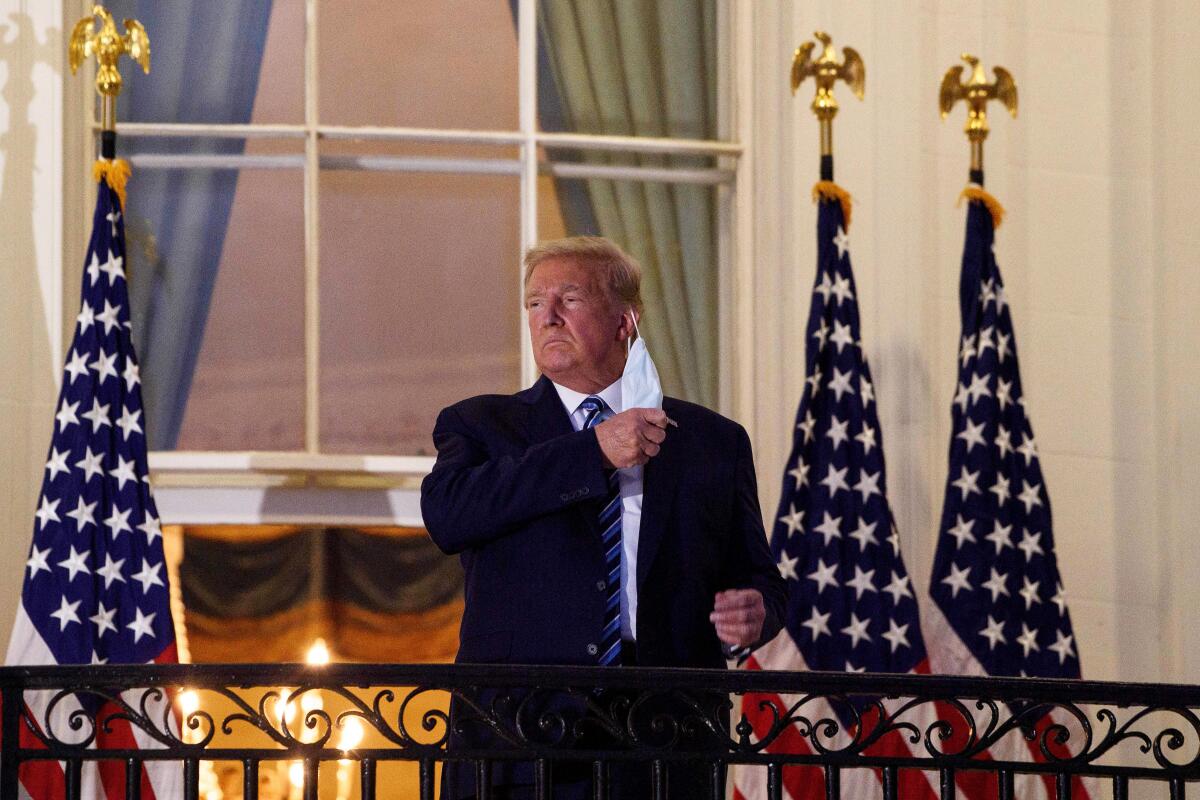The biggest entertainment stories
Get our big stories about Hollywood, film, television, music, arts, culture and more right in your inbox as soon as they publish.
You may occasionally receive promotional content from the Los Angeles Times.

Whether Trump or Biden wins the Nov. 3 election, difficult repair work lies ahead. The work of mending the torn fabric of American society. The work of restoring the values that form the foundation of our institutions. Can we bridge our cultural divide? Times critics weigh in on how artists can contribute to this repair work.
Who can help us imagine a different vision for America?
By CHARLES McNULTY, Theater Critic
AS SOMEONE WHO sees Joe Biden as the last exit before authoritarianism, I don’t know how I’d cope with four more years of Trump chaos. But the time has come to take the long view. Regardless of the outcome of the 2020 election, the fabric of the nation must be repaired — and no one is excused from this necessary work.
What role can artists play in the healing of a nation wounded by a viral pandemic and the chronic diseases of racism, inequality and rabid partisanship? Even for the proponents of art for art’s sake, politics is inescapable.
Aesthetes may be oblivious to the news crawl, but they don’t get to choose the conditions in which they work. To create is to bear witness, directly or indirectly, to life as it is lived at a specific historical moment. The macro and the micro inexorably converge whenever words, color, voices and bodies are arranged into vision.
As a critic belonging to no theoretical camp, I see little point in being programmatic or prescriptive. The delicate process of creativity isn’t determined by the will. But the cultural land becomes more arable when there’s broad recognition that artists matter to civic life, that their contributions clarify and cleanse the collective imagination. READ FULL STORY
Not everything need be about Trump. But if this figure of obsession cannot be resisted, let’s at least recognize him as more of a symptom than a cause.
— Charles McNulty
Simple acts of solidarity under threat
BY JUSTIN CHANG, Film Critic
ARE WE WITNESSING the end of the American experiment? Or just the end of the movies?
Whether you find these questions merely alarmist or genuinely alarming, they may seem odd to raise in the same breath. But for some of us, they have been curiously entwined sources of anxiety since earlier this year, when the COVID-19 pandemic sent the nation into social, economic and political freefall — and dealt a particularly cruel blow to an industry that, like the idea of democracy itself, thrives on an experience of public togetherness.
With film production and the industry’s usual distribution and exhibition mechanisms thrown into turmoil by the pandemic, the movie business faces a crisis of economic, logistical and existential proportions. The pleasures of casually, unconcernedly going out to the movies may return someday, but for some of us right now, it feels as distant a prospect as, well, bipartisan unity or a commitment to a peaceful transfer of power by the Trump administration.
Yet if our democracy can withstand the traumas of a sickened, demoralized electorate and a president bent on delegitimizing an unfavorable outcome, there is every reason to hope that the pleasures that sustain us, especially the art that we love, will also survive in the long run. Our national recovery could take years, and it will bring with it a sweeping reconsideration of how people behave and how industries do business. But when I envision the future of a healthy, hopeful, fully vaccinated electorate (a citizen can dream), I still can’t help but envision a movie theater — crowded with people who, in congregating together, are committing a simple yet powerful act of social solidarity. READ FULL STORY
Even if the democratic spirit of moviegoing is more dream than reality, it’s a dream I cling to fiercely, perhaps even more so at a time when democracy itself has rarely seemed more imperiled.
— Justin Chang
U.S. individualism isn’t rugged, it’s toxic — and it’s killing us

BY CAROLINA A. MIRANDA, Arts and Urban Design Columnist
THE PANDEMIC HAS been one long lesson in human adaptability. (Zoom theater anyone?) It has also been a revealer of ugly truths.
In the United States, COVID-19 has put front and center a host of economic and racial inequities. It has also shown the ways in which our sense of the collective has frayed.
The summer has seen a cinematic array of meltdowns in supermarkets and restaurants across the country, all inspired by the simple request to wear a mask. A customer inside a North Hollywood Trader Joe’s threw down her basket and blasted frontline staff with obscenities. A woman at a New York City bagel shop stalked up on another customer and deliberately coughed in her face.
And it has only escalated from there. ... We live in a culture of rugged individualism run amok. Call it toxic individualism. Because in the case of this pandemic, it is literally toxic. READ FULL STORY
Barn raisings as ideals of the collective have appeared in many New Deal-era murals. ... We need to channel its spirit — its American spirit.
— Carolina A. Miranda
These comedians made their names poking fun at Trump. The election may change that
BY ROBERT LLOYD, Television Critic
I AM NOT about to make any predictions as to the results of Tuesday’s election — if there will even be a Tuesday result — but I can say with some assurance that if the incumbent loses, we will be entering a different era of Web-based comedy.
This long moment has created at least one bona fide star in Sarah Cooper, who famously embodies President Trump to the soundtrack of his own voice, and who has made a Netflix special, subbed for Jimmy Kimmel and appeared at the Democratic National Convention. But plenty of others have made a mark in the world of sociopolitical miniature comedy and seen their stars rise in the Trump era.
The president is always the biggest target in town, of course, and because Trump is so far out of the norm — every norm you can think of, really — he, and the culture that has grown up around him, is a more tempting target than usual: the broad side of a barn that begs to be hit. You can count on a hand or two the comical pratfalls and supposed faux pas of past presidents — choking on a pretzel, wearing a tan suit — but in this administration, nearly every day brings something amazing, the satire that writes itself.
The forces shaping this do not all emanate from the White House, to be sure. Social media, which has coalesced around short-form expression, has made comical comment all the easier, if not inevitable, not the least because that is where the president himself may be found. TikTok, a favored platform for this kind of performance, launched in China in 2016 and elsewhere in 2017, the year Trump took office. And there is the added effect of the COVID-19 pandemic, which has made social media even more of a distraction. Indeed, we might have come to the point where what we used to call real life is a distraction from social media. READ FULL STORY
Don’t worry about these performers. ... the world and its problems, and its problematic people, will still have a long road to sanity whoever wins on Tuesday, or whatever day after Tuesday a winner is announced.
— Robert Lloyd
AOC is on Twitch and even Biden has an “Animal Crossing” island
BY TODD MARTENS, Game Critic
“WHAT DOES RESISTANCE mean to you?”
I didn’t know the woman’s voice on the other end of the line. No getting-to-know-you small talk transpired. In 30 minutes, we fast-forwarded to deeply personal, politically tinged conversation. One could answer honestly, as I attempted to do, or create a character and role-play. There was no real way to know during “A Call from the Resistance,” a work of improvisational telephone theater. ...
The “resistance” in this case wasn’t some underground shadow group manipulating culture behind the scenes. The resistance was any one of us, asking us to lay bare our messy, complicated and sometimes even contradictory thoughts on politics. ...
Though it’s an intimate show, “A Call From the Resistance” was on my mind during my initial hours playing “Watch Dogs: Legion,” a new big-budget video game from Ubisoft, a game studio in the midst of its own soul searching after numerous accounts of harassment and toxicity were brought to light and a company whose stance on politics has been akin to Donald Trump’s “very fine people on both sides” line after a white supremacist rally in Charlottesville, Va., turned deadly. ...
The games stand as examples on opposite ends of the spectrum of how we’re seeking to make sense of the world through play. This year, in particular, our stay-at-home lifestyle has accelerated the theory that games are the dominant medium of our time.
And games, of course, despite corporate pleas to the contrary have always been political. READ FULL STORY
Gamergate became a blueprint for Trump’s vitriolic attacks and Twitter dragging. Over the past four years this disinformation campaign morphed into its own game-like endeavor.
— Todd Martens
In 1990, MTV and Madonna shook up politics. Will the youth vote do the same in 2020?
BY STEPHEN BATTAGLIO

IN 1990, MUSIC executive Jeff Ayeroff had been growing increasingly frustrated at the effort by Washington politicians to censor artists in his industry.
Then he decided to get even.
Using MTV and the hottest pop star of the moment, Madonna, his vengeance had a lasting impact. ...
“It was always good fodder for politicians to take on rock ‘n’ roll because they knew kids were not a constituency,” he said in a recent phone conversation from his home in Los Angeles. “They didn’t vote enough to make a difference and you could scare their parents.”
Instead of just lobbying lawmakers to protect the creative expression of his artists, Ayeroff went a major step further by forming a nonprofit, nonpartisan organization dedicated to boosting voter registration and participation among young people — historically a group less likely to show up at the polls.
Ayeroff’s creation, Rock the Vote, has lasted three decades, evolving into a technology-driven resource that helps register first-time voters from underrepresented groups. Its current reach goes far beyond its days of wrangling Metallica or Michael Bolton fans to sign registration cards outside of arenas. READ FULL STORY
Rock the Vote was early in recognizing how young people were migrating away from traditional television and toward the internet
— Stephen Battaglio
The biggest entertainment stories
Get our big stories about Hollywood, film, television, music, arts, culture and more right in your inbox as soon as they publish.
You may occasionally receive promotional content from the Los Angeles Times.